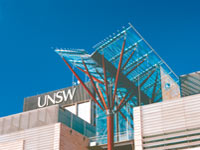Engineering Science - 5341
Program Summary
Faculty: Faculty of Engineering
Contact: http://www.engineering.unsw.edu.au/
Campus: Sydney
Career: Postgraduate
Typical UOC Per Semester: 24
Min UOC Per Semester: 6
Max UOC Per Semester: 24
Min UOC For Award: 48
View program information for previous years
Program Description
Students will add breadth to their knowledge of engineering in general and expand their knowledge and skills in engineering management. Students will develop their technical knowledge and ability to analyse engineering problems. They will also gain further skills in solving engineering problems and justifying professional decisions.
(* It is also possible for students to acquire knowledge and skills in a different specialisation at the approval of the Stream Authority. This may require the student to take additional foundation and disciplinary knowledge courses at the discretion of the Stream Authority.)
Entry requirements
In order to be admitted to the program students need a recognised four year Bachelor degree in a relevant discipline of engineering with a minimum 65% average.
NOTE: The minimum average required for entry is as determined by the UNSW Postgraduate Entry Score Calculator. Students from a non-211 university in China need a minimum 70% average.
Those without such a qualification are required to argue their prior learning is equivalent to this qualification. For example, a 3- or 4-year Bachelor of Engineering or Science combined with relevant discipline experience (exact positions and roles that will be considered relevant to be decided by each specialisation) may be recognised.
Program Objectives and Graduate Attributes
- Updating technical knowledge and skills in an existing engineering specialisation.
- Acquiring new knowledge and skills in a different engineering specialisation.
- Developing and expanding knowledge and skills in engineering management.
- Updating qualifications and knowledge to meet or maintain professional accreditation standards.
- Providing opportunities for continuing professional development.
- Providing opportunities for interaction with those at the cutting edge of the discipline.
- Providing a pathway towards the Masters program.
Disciplinary Knowledge and practices
- Graduates will develop theory-based knowledge and techniques within their chosen specialisation.
- Graduates will broaden their knowledge of engineering, including engineering management.
- Graduates will be able to proficiently apply engineering methods to complex engineering problem solving.
- Graduates will develop their ability to define, investigate and analyse engineering problems and develop creative and innovative solutions to these problems.
- Graduates will demonstrate professional-level skills in presenting information and justifying decisions to other professionals, clients, stakeholders and the broader community.
- Graduates will demonstrate creative and ethical approaches to practice.
- Graduates will develop their ability to work as team members and leaders.
- Students will develop an appreciation of the issues associated with international engineering practice and global operating contexts.
Program Structure
- Chemical Process Engineering
- Civil Engineering
- Electrical Engineering
- EnergySystems
- Environmental Engineering
- Food Process Engineering
- Geospatial Engineering
- Geotechnical Engineering & Engineering Geology
- Manufacturing Engineering & Management
- Mechanical Engineering
- Petroleum Engineering
- Petroleum Engineering Open Learning
- Photovoltaics & Solar Energy
- Project Management
- Renewable Energy Engineering
- Structural Engineering
- Telecommunications
- Transport Engineering
- Water Engineering: Catchments to Coasts
- Water, Wastewater & Waste Engineering
At the discretion of the Program or Stream Authority, students may be required to develop their foundational disciplinary knowledge through enrolment in undergraduate level courses that are deemed appropriate by the Authority. Students will be granted credit towards the program for the satisfactory completion of these courses up to a maximum of 12UOC.
Advanced Standing
A student may apply for credit towards the program. For example, a student with a 4-year engineering honours degree could obtain a maximum of 24UOC of advanced standing. Applications for credit should be addressed to the Stream Authority (see relevant school site for further details).
Academic Rules
Progression in all postgraduate coursework programs in the Faculty of Engineering is permitted by course. However:
(a) Not all courses are available every session and some courses may only be available in alternate years. Students should check the approved list of courses for their specialisation and the Engineering and Technical Management specialisation for further details. Students will need to select courses carefully to ensure they can complete their program in minimum time. Students are not permitted to enrol in courses with clashing timetables.
(b) Students must satisfy the rules governing re-enrolment. A student's academic standing is evaluated at the end of each session. Any student not in Good Standing should discuss the situation with the Academic Adviser in the relevant school, and may be required to talk to a counsellor in the Careers and Counselling Unit. The full description of the University policy governing enrolment and academic standing can be found at Academic Standing
(c) Students must satisfy the relevant pre-requisite and co-requisite requirements for each course.
(d) Only in exceptional circumstances will students be permitted to enrol in more than 24 units of credit in a session. The part-time mode will usually require students to enrol in a minimum of 18 UOC within any three consecutive sessions.
(e) Students are only permitted to enrol in courses that satisfy the program requirements as specified in the On-Line Handbook for the program in which they are enrolled. Enrolment in any other course is permitted only on a Non-Award basis, that is, on a tuition fee basis.
(f) Notwithstanding the above, before a student can enrol in any non-standard program, such a program must meet with the approval of the relevant program authority as shown in the program rules.
Fees
Transfer Between Programs
Computing Requirements
Field Excursions and Site Visits
Part-time Study
Area(s) of Specialisation









